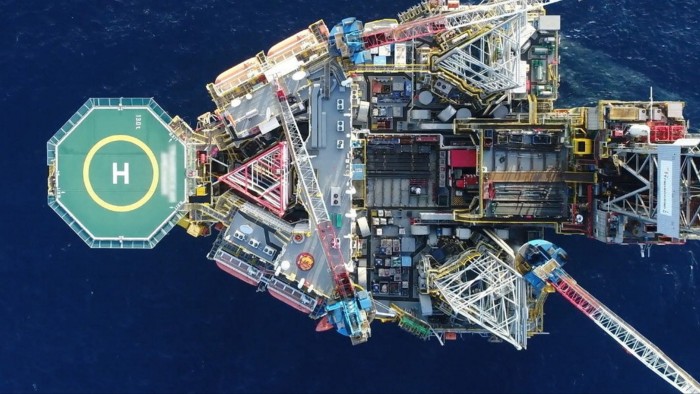The chief executive of a North Sea oil and gas group faked bank statements and forged board documents to steal at least €143.8mn, according to a London lawsuit filed by his former company and backer of an Iranian petrochemicals maker.
The High Court claim is one of several legal battles around the world that have entangled Francesco Mazzagatti, an Italian national who is the chief executive and majority owner of Viaro Energy. The company, and Mazzagatti, became significant players in the UK energy market after it bought RockRose, a listed group with assets in the UK and Dutch North Sea, for £247mn in cash in 2020.
Mazzagatti, and Viaro’s chief financial officer, Francesco Dixit Dominus, are being sued in London by the Singaporean trading company that Mazzagatti once owned, Alliance Petrochemical & Investment (API). It claims its former boss may have “used at least part of the misappropriated funds to acquire a majority share in RockRose Energy”.
Mazzagatti and Dixit Dominus deny the claims.
API — where Mazzagatti was chief executive between July 2018 and September 2020, according to the company — part-owns the Mehr Petrochemical Company (MHPC) in Iran and is a distributor of its products, such as polyethylene.
Just months after becoming chief executive, Mazzagatti incorporated a new company, Alliance Petrochemicals Trading (APT), in the Gulf state of Sharjah “without the knowledge of API’s other directors”, the company alleges in the London lawsuit.
He then faked a board resolution authorising him to open APT bank accounts with himself as the sole signatory. Customers of API then paid into a string of accounts across Singapore and the United Arab Emirates that were set up and controlled by Mazzagatti and Dixit Dominus, in exchange for products from the Iranian company, MHPC, according to the claim.
“The full extent of the fraud carried out by the defendants is not known to the claimant,” API alleges. But it calculates that at least €143,808,798.66 was misappropriated, which the company says represents the total amount owed to MHPC by API by August 2023 in exchange for its petrochemicals.
API claims the pair covered up the misappropriation through “false representations” to the board. In 2021, following a meeting in Dubai, Mazzagatti “produced a false bank statement” to show that there was a balance of nearly Dh100mn (€25.8mn) being held in an account in the UAE. He had previously told API’s other directors that the instability in the Middle East meant it was “better for the funds owed to MHPC to be held outside Iran”.
A court in Tehran already ruled in May 2023 that MHPC should not deliver any more products to API and that API owed the Iranian company approximately $170mn, according to the London lawsuit.
The High Court claim also alleges that Mazzagatti may have “used at least part of the misappropriated funds to acquire a majority share in RockRose Energy”. To help secure the deal, Viaro relied on a £250mn loan guarantee from Sheikh Zayed bin Surror bin Mohammed Al Nahyan, a member of the Abu Dhabi royal family, according to the claim.
This helped calm objections from Taqa — Abu Dhabi’s state-owned electricity and water company, which was involved in a joint venture with RockRose — that Viaro would use RockRose’s cash balances to pay for the deal, leaving the North Sea company unable to meet its liabilities, including the decommissioning costs of the joint ventures, the claim alleges.
Subsequently, RockRose went on to loan approximately £202mn to Viaro to fund the deal, with the remainder of the £247mn purchase price being made up from the misappropriated funds, the claim alleges. This is denied by Mazzagatti.
Taqa has since brought a separate claim in the High Court against Viaro and Mazzagatti, along with other defendants, alleging that RockRose declared an $84mn dividend shortly before selling an oilfield for $1 without the means to meet its liabilities. The defendants deny the claims in the Taqa lawsuit. There is yet to be a judgment.
In response to API’s claim, Mazzagatti and Dixit Dominus deny any misappropriation of funds and say the lawsuit is being orchestrated by a third party, Arshiya Jahanpour, a former close friend of Mazzagatti, who urged him to buy API on his behalf. Jahanpour then became frustrated by the Italian’s decision to subsequently sell him only half of the trading company, selling the other 50 per cent to another friend, Nejla Baccouche, according to defence arguments.
The defence states that it was Jahanpour, not Mazzagatti who had “sole control” of API from around September 2018 onwards. Neither Mazzagatti nor Dixit Dominus “is responsible for any unlawful payments”, according to the defence. Instead, it argues that API is seeking to “(wrongly) blame or ascribe liability to the Defendants for transfers that were either legitimate, or alternatively must have been a procurement of funds by Mr Jahanpour”.
The defence alleges that the various bank accounts opened by Mazzagatti were “opened by or at the request of Mr Jahanpour, and Mr Jahanpour controlled them at all material times [ . . .] Mr Jahanpour was worried about having assets in his own name, including due to increased scrutiny because of his US citizenship.” It adds that Mazzagatti trusted Jahanpour enough to allow him to use his name “but was not involved in the operation of the accounts”.
Jahanpour could not be reached for comment.
A trial date is yet to be set.
Read the full article here

